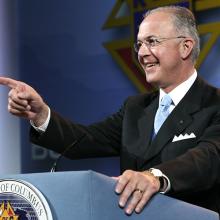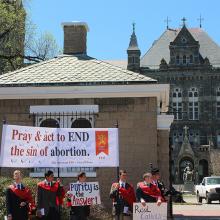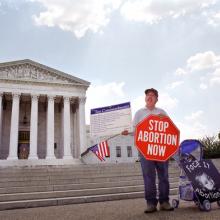Pro-choice
THE REPRODUCTIVE HEALTH landscape in the United States has changed drastically in the last year, and it continues to change. But some things remain the same. One consistent aspect of our ongoing national conversation is that many of those who support the greatest restrictions, including on access to abortion and other elements of reproductive health, claim Christian faith as a primary motivator.
I spent much of my young adulthood in evangelical contexts where people had strong opinions about faith and reproductive rights. Most evangelicals I knew believed that life begins at conception and thus abortion should be broadly prohibited by the law as akin to murder. In these spaces, the Bible was considered the main — sometimes the only — source of authority when it came to navigating ethical questions. I’ve come to realize, though, that the Bible hardly speaks anything straightforward into the intensely personal realm of when human life begins and what decisions should be made in complicated, real-world situations.
I wonder, then: What does it look like to wade through this murky territory as people of faith? Who are Christians called to be in a post-Roe world?
IN THE EIGHTH season of Call the Midwife, set in post-war east London, nuns and nurse midwives of Nonnatus House assist a woman with severe complications from a “backstreet” abortion. Sister Julienne says to a young nurse, “The word ‘midwife’ means ‘with-woman.’ A woman in that situation needs somebody by her side.”
I’m pro-choice, which was an unpopular stance in the Catholic community I grew up in. For my views on reproductive rights, people in youth group called me a “baby killer” and “Pontius Pilate.” During Advent, specifically, I loathed the hollow teachings on Mary and childbirth. We sanitized the Nativity into a cute story — the equivalent of a Disney movie featuring a white family and a manger crowded with men. Only recently did I learn that some scholars believe that midwives attended Jesus’ birth. As reproductive freedom and care are further undermined in the United States, this is an apt time to reclaim a more feminist view of the Nativity and rethink Advent as the season of the midwife.
FOR 30 YEARS, I held an uncompromising conviction that abortion was murder. I preached against “child-killing,” suffered multiple arrests for blockading clinics, and had pro-choice groups successfully sue me. I led a national anti-abortion organization and directed the only large-scale annual pro-life event held in the U.S. Capitol. I personally appealed to Supreme Court justices to overturn Roe v. Wade.
Today, I no longer have these positions, and I did not applaud the recent reversal of Roe. I remain an evangelical by belief, but I now call myself a “pro-choice pro-lifer.” I have concluded that legislators and judges are not the people to try to resolve this complex, moral, social, and health-related question. Even among religions, there is no consensus on what constitutes permissible or impermissible abortion. Moreover, each woman’s experience with pregnancy is unique. Therefore, there can be no universal mandate forcing her to continue her pregnancy.
My transformation from an absolute to a nuanced position on abortion proceeded slowly and fitfully. Many exasperated old pro-life movement friends ask, “Whatever happened to you?” The short answer: empathetic listening. There came a moment when I realized I was doing all the talking and no listening on this subject. For nearly three decades, I had lived isolated in a fantasy where I presumed everything would work how it was supposed to, so I questioned nothing. In this fictitious pro-life world, all a woman in an unwelcomed pregnancy needed was to call out for help. In response, pro-life people would instantly help her, offering free housing, parenting supplies, medical care, babysitting, and, should she so choose, adoption. “With so much support,” I asked my audiences rhetorically, “why would anyone choose abortion?” I didn’t want answers.
How do marketing techniques, such as surveillance and data gathering, fit with the mission of the church?
As the country awaits the Supreme Court decision on federal abortion rights in Dobbs v. Jackson — which many expect will overturn Roe v. Wade — politicians, activists, pollsters, and news outlets are highlighting polling on abortion.
Deeply flawed and alarming. That was my reaction last week as I read the leaked draft of the Supreme Court opinion that would repeal Roe v. Wade, unravelling nearly 50 years of judicial precedent and placing abortion rights into the hands of state lawmakers.
On the evening of May 2, Politico reported on a leaked draft of a Supreme Court decision in Dobbs v. Jackson which, if it became official, would overturn Roe v. Wade and end federal protections of abortion rights.
As Baptist minister and CEO of the Religious Coalition for Reproductive Choice, Zeh has participated in plenty of “circular conversations regarding the moral absolutes of abortion.” But as she writes in her new book, A Complicated Choice: Making Space for Grief and Healing in the Pro-Choice Movement, these debates often overlook how abortion always “happens within a person’s real, full, and complex life.”
“Life” issues have once again become extremely politically divisive. Claiming to be either “for the women” or “for the babies,” turns empathy for only one life into single-issue voting on both sides of the political spectrum. Instead of reducing abortion access to a political football — and even into competing billboards on national highways — we all should seek to expand and deepen the conversation, especially Christians, who should not be beholden to right or left but rather to a consistent ethic of life for women and children.
The Rose Garden event was part of a deliberate strategy to raise the visibility of anti-abortion protesters, who have complained they haven’t gotten as much attention as other Washington protests, including last year’s Women’s March — which specifically excluded women opposed to abortion.
Women's, LGBTQ rights, and other physician groups have expressed concern for the heavy implications on patients' access to abortion and treating LGBTQ patients.
I went to the March for Life, mostly out of curiosity and a conviction to break out of my liberal bubble and some of my preconceived notions about pro-lifers. Instead, I was faced with a very bleak question: To be pro-life, do you have to support Donald Trump?
Last week, organizers for the Women’s March on Washington encountered pushback on multiple sides for removal of pro-life sponsors, leading many to wonder if there was space in the movement for Christians or women who are opposed to abortion. But many who attended the march on Jan. 21 were driven there by their religious convictions — saying President Donald Trump’s positions “violate the gospel” by showing a lack of compassion for Muslims, people of color, and women.
For the first time in three general election debates, a moderator asked the presidential candidates on Oct. 19 about abortion.
Given that abortion has rightly been described as the source of America’s second civil war, there has been a baffling lack of engagement with it this election cycle.

Carl Anderson. Image via Knights of Columbus / RNS
Carl Anderson, leader of the Knights of Columbus fraternal order and one of the most influential lay Catholics in the church, has said that abortion outweighs all other issues in the presidential campaign and Catholics cannot vote for a candidate who supports abortion rights.
Abortion is not “just another political issue” but “is in reality a legal regime that has resulted in more than 40 million deaths,” Anderson told the Knights’ international convention in Toronto in a speech on Aug. 2.

Image via Adelle M. Banks / RNS
The debate that began when students learned that Planned Parenthood President Cecile Richards would speak at the nation’s oldest Catholic university continued when she received a standing ovation at Georgetown’s Lohrfink Auditorium. The media was not permitted inside, but students who heard her said she defended her organization’s stances and urged abortion opponents to respect those who think women should have choice in their reproductive decisions.

Image via REUTERS/Joshua Roberts/RNS
Donald Trump sparked outrage across the ideological spectrum with a call to punish women who obtain abortions if the procedure is banned. Later, however, Trump clarified his position, saying in a campaign statement that, if abortion is banned, “the doctor or any other person performing this illegal act upon a woman would be held legally responsible, not the woman. The woman is a victim in this case as is the life in her womb.”

Image via Ryan Rodrick Beiler / Shutterstock / RNS
Nearly a quarter-century after its last major ruling on abortion created a fragile balance between women’s rights and government restrictions, the Supreme Court appears ready for a rematch.
And like the last time, the debate would unfold in the midst of a presidential election.
The first act could play out as early as Nov. 13, when the justices may decide whether to hear a challenge to tough new limits placed on abortion clinics and doctors in Texas. The restrictions — forcing doctors to have admitting privileges at nearby hospitals and requiring clinics to measure up to outpatient surgery centers — threaten to leave the state with just 10 clinics clustered in four population centers and along the Mexican border.
On Aug. 22, thousands of activists protested at Planned Parenthoods around the county, calling for an end to funding for clinics.
The protests came on the heels of last month's viral videos, released from little-known group Center for Medical Progress, which claimed to show Planned Parenthood employees discussing illegally harvesting and selling aborted fetal organs. Planned Parenthood has argued the videos are misleadling, deceptively edited from a conversation about legal fetal tissue use for research.
Though no Planned Parenthood clinic exists in Washington, D.C., protestors gathered a "public witness prayer event" at a construction site of what organizers said was a Planned Parenthood building in process.
Sojourners went to the rally to ask attendees, many self-described people of faith, what they were praying for.

Living cells, mixed media artwork. Ruslan Kokarev / Shutterstock.com
It’s not often words escape us. But in the aftermath of the now viral recording(s) raising concerns over whether Planned Parenthood seeks profit from aborted fetal tissue — and the crassness with which its representative discusses how to accomplish it without “crushing” the tissue/organs — that’s where we were left: with no words. We confess to being at a complete loss of what to say in the face of humanity’s brokenness.
Beyond the ethical questions of how an organization receives payment for tissue sales or the debates around the potential benefits of the patients’ donations of fetal tissue, the videos are an in-your-face reminder of our culture’s blatant disrespect for life.
That disregard is not unique in our society, of course. Journalism: “If it bleeds, it leads.” Medicine: “There’s nothing more to be done. She’s a vegetable.” Justice system: “He’s gonna fry.” War: “Light ‘em up.” Uncomfortable questions about life and death and ethics are best papered over with emotionless cliché, obviously.
As a society and as individuals, when we fail to recognize the imago dei in others, we trend further away from our uniquely human capacity to empathize and closer to isolated, analytical, and almost robotic assessments of value.














